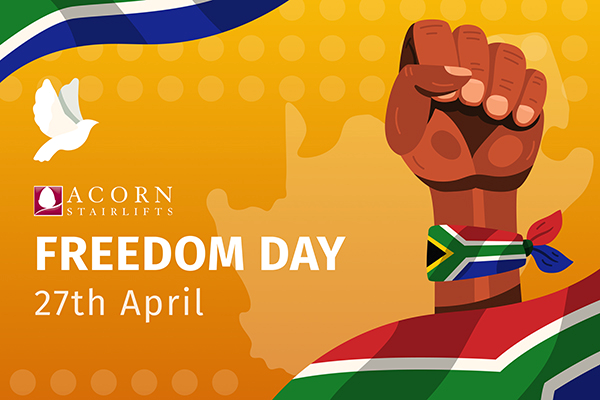As Freedom Day approaches in South Africa, it's time to pause and reflect on the profound significance of this national holiday.
This pivotal moment in South African history not only symbolised the end of apartheid but also heralded the dawn of a new era of freedom, democracy, and equality—a testament to the resilience, courage, and unity of its people.
This year, as we commemorate the journey from apartheid to democracy, let’s delve into the rich history behind Freedom Day, exploring six meaningful ways to honour this monumental occasion and uphold our commitment toward building a more inclusive and equitable South Africa.
What is Freedom Day?
Freedom Day in South Africa is celebrated annually, commemorating the first democratic elections held in South Africa in 1994.
These elections marked the end of apartheid and the beginning of a new era of freedom, equality, and democracy in the country.
When is Freedom Day?
Freedom Day is celebrated every year on the 27th of April, marking the date of the first democratic elections in South Africa.
This year, in 2024, Freedom Day falls on a Saturday.
What is the History Behind This Holiday?
Freedom Day in South Africa commemorates the historic event of 27 April 1994, when the country held its first non-racial democratic elections.
This election marked the end of apartheid, a system of institutionalised racial segregation and discrimination enforced by the National Party government from 1948 to 1994.
Apartheid had deep roots in South Africa's history, with discriminatory laws and practices that segregated people based on race, limiting the rights and opportunities of the non-white population—particularly black South Africans.
This led to widespread oppression, inequality, and resistance, both domestically and internationally.
After decades of struggle against apartheid, negotiations between the apartheid government, led by President F.W. de Klerk, and anti-apartheid movements, notably the African National Congress (ANC) led by Nelson Mandela, resulted in the dismantling of apartheid and the establishment of a democratic system.
The 1994 elections were a turning point, being the first where all South Africans, regardless of race, were allowed to vote.
Consequently, Nelson Mandela, who had spent 27 years in prison for his anti-apartheid activities, emerged as the leader of the ANC and was elected as the first black President of South Africa in those historic elections.
This is why the 26th of April was such a pivotal moment in South Africa's history, symbolising the triumph of democracy over oppression and the beginning of a new era of freedom, equality, and reconciliation in the country.
Freedom Day continues to serve as a reminder of the struggles endured by many South Africans and celebrates the progress made towards a more just and inclusive society.
Significant Ways to Celebrate Freedom Day and the Impact it Made in South African History
1. Attend Commemorative Events
In celebration of Freedom Day, many cities and communities in South Africa organise events such as concerts, festivals, and parades.
These events often feature music, dance, speeches, and cultural performances that highlight the significance of the day, honouring the sacrifices made during the struggle against apartheid.
Attending these events is a significant way to show solidarity and celebrate the progress made towards freedom and equality.
2. Reflect Back on History
Another way to observe Freedom Day is to take some time to reflect on the history of apartheid, as well as the journey towards democracy in South Africa.
To dive deeper into South Africa’s democratic development, you can visit museums, historical sites, or libraries that document the struggle against apartheid, such as the Apartheid Museum in Johannesburg or Robben Island, where Nelson Mandela was imprisoned.
Educating oneself about the past helps to appreciate the significance of Freedom Day and the importance of preserving and promoting democracy.
3. Volunteer for Social Justice
Freedom Day is an opportune time to give back to the community and support initiatives that promote social justice and equality.
For example, consider volunteering at local organisations or charities that work towards empowering marginalised communities, promoting education, or advancing human rights.
Engaging in acts of service helps to honour the spirit of freedom and solidarity that defines the day.
4. Celebrate South African Culture
One of the best ways to celebrate Freedom Day is to explore and celebrate the diverse cultures, languages, and traditions of South Africa.
Attend cultural performances, try traditional cuisine, or participate in activities that showcase the richness of South African heritage.
Embracing and appreciating the country's cultural diversity is a meaningful way to celebrate the day that constructed the invaluable principles of unity and inclusion in South Arica.
5. Organise Discussions and Workshops
One way to celebrate Freedom Day is to facilitate discussions, workshops, or seminars on topics related to democracy, human rights, and social justice.
You can even invite speakers, activists, or community leaders to share their insights and experiences on issues such as reconciliation, diversity, and inclusive governance.
Encouraging dialogue and raising awareness fosters a deeper understanding of the challenges and opportunities in building a democratic society.
6. Promote Civic Engagement
Use Freedom Day as an opportunity to promote civic engagement and participation in democratic processes.
Encourage voter registration, voter education, and advocacy for issues that impact the community.
For example, you can organise voter registration drives, mock elections for youth, or debates on local governance issues.
Remember that empowering citizens to actively participate in shaping their society is essential for sustaining democracy and upholding the freedom that we all enjoy today.

